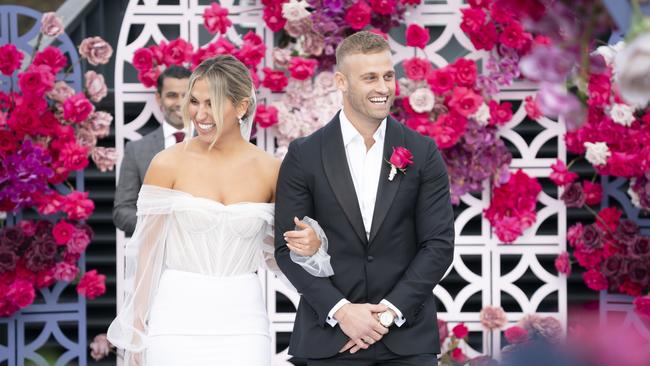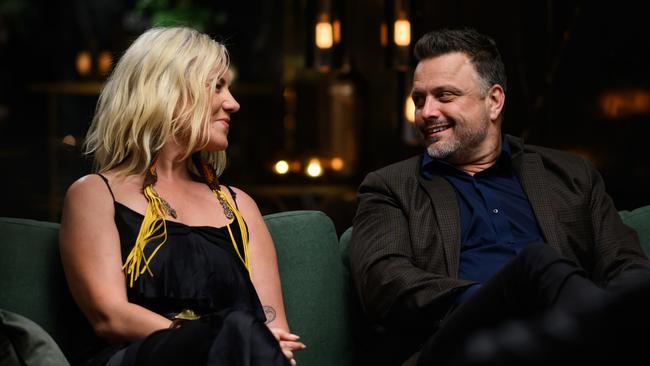MAFS is a cry for help about the state of gender relations in Australia

MAFS is now the most successful franchise to come out of Nine since the cricket world series. The premise of the show sees women and men (including for the first time this year a gay man matched with a husband) walking down the aisle with partners all chosen by “relationship experts”. They then live together, and love hopefully blossoms. What usually happens is confected drama and editing that puts Hollywood editors to shame.
One could only imagine what the late Kerry Packer would think ... of the concept, the cast and the series that has seen drinks and vicious insults being thrown around at filmed dinner parties and counselling sessions for young Australians bloated with self esteem and Juvederm, for 11 seasons now.
There are no calls from management these days screaming “get that s..t off air”. Instead MAFS has become a ratings and financial juggernaut for the network. Before the last episodes of the latest season went to air, casting had already begun for the next instalment.
According to OzTAM figures, the series has been watched by 14.2m people. A Nine spokeswoman told The Australian the show has “recorded year-on-year growth” across live broadcast (up 4 per cent) and streaming (up close to 10 per cent).
On Monday, about 2m people tuned in to watch the “reunion” final episode. About 75,000 more watched the night before for the “final dinner party”, where they all returned to rake over past grievances and future plans.
Both episodes are among Nine’s top rated shows of the year, beaten only by the Australian Open tennis men’s final which managed to secure just 60,000 more eyeballs.
Advertisers couldn’t get enough either. As well as messages about fast food, Uber, sex toys and toothpaste during the program which streamed on 9Now – Nine’s play on demand platform – the ABC also took up some ad space and promoted its own streaming service, iView.
“Married at First Sight is more than a television program. With more than 2m Australians watching every episode, it is a cultural phenomenon,” Nine’s director of television Michael Healy says.
MAFS is McDonald’s for the brain.
A binge does have the ability to turn one’s grey matter – and optimism for the future – into the consistency of a sickly sweet sundae. Yet watch it side-by-side with Question Time in Canberra and the casual viewer would only be able to pick the difference between both cohorts of attention seekers by the depth of their open collars.
Healy is right.
MAFS is more than a TV show. It’s a cry for help about the state of gender relations in this country. It especially highlights how badly we’re failing our young men.
The cast includes a plethora of glossy, beautiful women who would not look out of place in a Picasso exhibition.

Every season, each one comes bearing a thirst for infamy and tales of woe from relationships past. Cheated on, ghosted, left at the maternity ward, the inability to ignore an ex. Fed up with dating in reality, they are seeking the assistance of television producers to seek attention. Sorry. Amore.
Enter their potential partners.
The Barbie movie may have been snubbed by Hollywood and the Oscars, but it’s a different story in North Sydney. Each groom picked by Nine in 2024 was a Ken doll.
We had Gym Ken Jack – a personal trainer from the Gold Coast – who was seeking a passive wife who would enjoy a life of tuna and rice suppers and casual misogyny.

Virgin Ken Collins, who built a “pillow fort” between his partner, cried when she asked to leave “the experiment” after he requested to live in separate apartments.
Vigilante Ken Jayden, who, despite admitting to punishing a previous ex-girlfriend who cheated on him by sleeping with her friend and making her watch, made himself the moral compass of the show.
The women in comparison appeared to be pillars of aspiration (all female contestants increased their social media followers by about 80 per cent), but they also understood how to move about the world with modern manners and without the need to be mothered.
They weren’t perfect.
Dietician Sara — who failed to tell her “online business owner” husband Tim she was ditching their date night to have drinks with her former boyfriend – was confronted (mainly by Jayden) about her infidelity.

Tori – a self-described “independent professional woman” – was criticised for sticking by her husband who fat-shamed others, admitted to not being attracted to her and told another groom to “muzzle” his wife while she was attempting to hold him to account for his poor behaviour.
Others were exasperated by the treatment they copped by their male partners who were all, on varying scales, emotionally crippled.
These men – of varying ages from early 20s to mid 60s – went on reality TV and sat on the couches of made-for-TV therapists, rather than seeking actual professional help.
Each had issues with accessing, monitoring and expressing their feelings.
All of them failed, at least once, during the show to even attempt to understand the perspective of their wives during disagreements. Partly because the issues these blokes were dealing with were a lot more serious than those of their female counterparts. They grappled with frail mental health, grief and shaky body confidence. Yet it automatically fell to their partners to shoulder the burden of their behaviour to help them through.
The brides should next appear on The Block with the amount of renovating they had to perform.
Each relationship was not so much the beginning of two people’s happily ever after as it was project management for the brides of their of grooms.
Take Cass – an admin officer from Queensland – who was bubbly, outgoing and optimistic while also mourning the death of her first boyfriend and mother. She was matched with Tristan – a 30-year-old events officer from NSW – who at one stage told the experts and his co-stars that he “hates himself” as he has always struggled with his weight and finding connections with women.
Sneaky editing and the splicing and dicing of footage amplified everything, but it was difficult to watch how both individuals grappled with these issues, and each other, while trying to build a romantic connection. Tristan then threw a tantrum when Cass asked to leave.
Another star, Lucinda – a compassionate wedding celebrant from Byron Bay – was matched with Tim, a convicted drug smuggler, who wouldn’t touch or open up to her until midway through the season. He proudly proclaimed he was “like the Tin Man from The Wizard of Oz” and didn’t like to talk about feelings (or his criminal past) until the final credits rolled.
Lucinda cracked.
“Am I signing up for minimum affection? Am I signing up for someone who can’t share their emotions?”

The silver lining was witnessing both Tristan and Tim acknowledge their troubles. But the excessive emotional labour required by their partners should be something the Fair Work Commission should look into.
The highlights of the season was not the salacious scenes and sound bites, it was the way it held up a mirror to how far we have to go when it comes to breaking down the barriers men face.
There are still oceans of difference between how men and women interact and seek help.
Women are talkers. Men – if this MAFS sample size is anything to go by – are unable to shake off conditioning to not seek external help from friends and professionals when it comes to “hidden” issues like emotional pain and mental turmoil.
MAFS cops a lot of criticism. Rightly so. It’s got about as much depth as a paddling pool. Yet if it continues to help shine a light on how we can help bridge the gender divide to stop women being the carers and men being closed off, sign me up for another serving of this televisual junk food.







Death, taxes and an inability to look away as strangers marry each other on reality TV are three certainties in life, as any good closet lover of Married At First Sight will tell you.